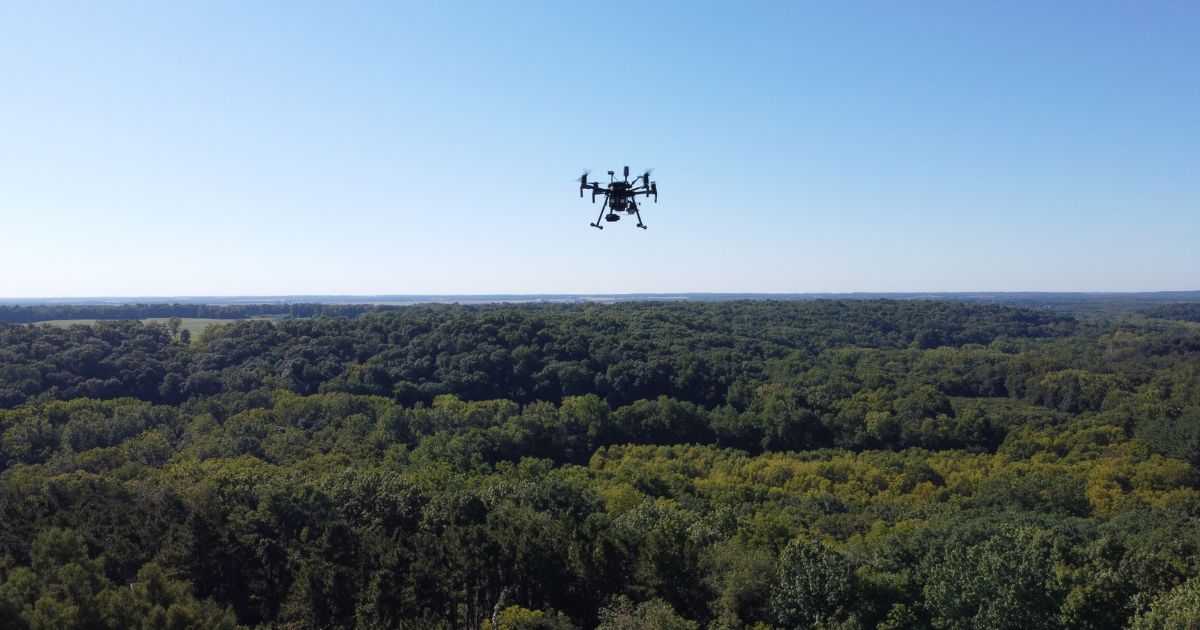Purdue to boost climate-smart forestry practices among private landowners
Purdue University has received $12 million of a $35 million project led by the American Forest Foundation and funded by the U.S. Department of Agriculture’s Partnership for Climate Smart Commodities to help family forest owners practice climate-smart forestry in Indiana and eight other states throughout the eastern half of the U.S.
The project’s other partners are The Nature Conservancy, the Center for Heirs Property Preservation, and Women Owning Woodlands. The project could sequester an estimated 4.9 million tons of atmospheric carbon—a greenhouse gas that affects climate—over a 20- to 30-year period.
“Our digital forestry group has been working on various tools and thinking about how to apply these tools to real-life problems,” said Songlin Fei, who directs Purdue’s Integrated Digital Forestry Initiative. “This is an opportunity to apply our expertise to solving part of the climate-change puzzle.” Purdue’s cross-disciplinary Integrated Digital Forestry Initiative includes faculty members from the colleges of Agriculture, Engineering, Sciences, Liberal Arts and Libraries and the Polytechnic Institute. The Integrated Digital Forestry Initiative, one of the five strategic investments in Purdue’s Next Moves, leverages digital technology and multidisciplinary expertise to measure, monitor and manage urban and rural forests to maximize social, economic and ecological benefits. “We’re bringing a traditional field into the digital age,” said Fei, professor, Forestry and Natural Resources, and Dean’s Chair of Remote Sensing.
 Drone being used to map forest research plots over Purdue’s Martell Woods and help guide recommendations (best practices) for land owners.
Drone being used to map forest research plots over Purdue’s Martell Woods and help guide recommendations (best practices) for land owners.
Purdue will utilize advanced digital forestry technologies to do the measurement, monitoring, reporting and verification of carbon sequestrations that the project requires. The automated technology, applied at a regional scale with unprecedented accuracy, will be based on data collected by satellites and drones with various sensors, such as light detection and ranging (LiDAR). The team will also develop a simulation system that will utilize artificial intelligence to generate optimized forest management scenarios.
The work will result in a web-based tool that landowners can use to estimate and predict the climate-smart commodity market potential of their properties. The team is also building a smartphone-based app for tree measurement and monitoring.
American families own nearly 40 percent of the nation’s forests, yet few of them take part in forest carbon projects or work from a management plan. However, with proper management, trees can grow faster and sequester more carbon, Fei said.
Landowners will receive economic incentives for participating in the program. Payment to landowners will depend on which climate-smart carbon practices they use. Project staff or consulting foresters will also provide landowners technical advice and guidance in establishing a forest management plan.
The project partners aim to enroll 1,600 landowners, who control a total of over 160,000 acres—about 250 square miles—of family forests, into the Family Forest Carbon Program (FFCP), which was developed by the American Forest Foundation and The Nature Conservancy. The foundation and the conservancy will make special efforts to recruit rural, minority and women forest landowners in collaboration with the Center for Heirs Property Preservation and Women Owning Woodlands.
The FFCP already operates in a dozen states in the upper Midwest and the Northeast. The USDA grant will bring nine more states into the FFCP: Indiana, Ohio, Kentucky, Tennessee, Virginia, North Carolina, South Carolina, Georgia and Alabama. In several states, such as Indiana, hardwood-related commodities contribute significantly to the economy.
“This grant allows us to combat climate change, put technology into the hands of forest landowners, and engage underserved and rural Americans,” Fei said.






